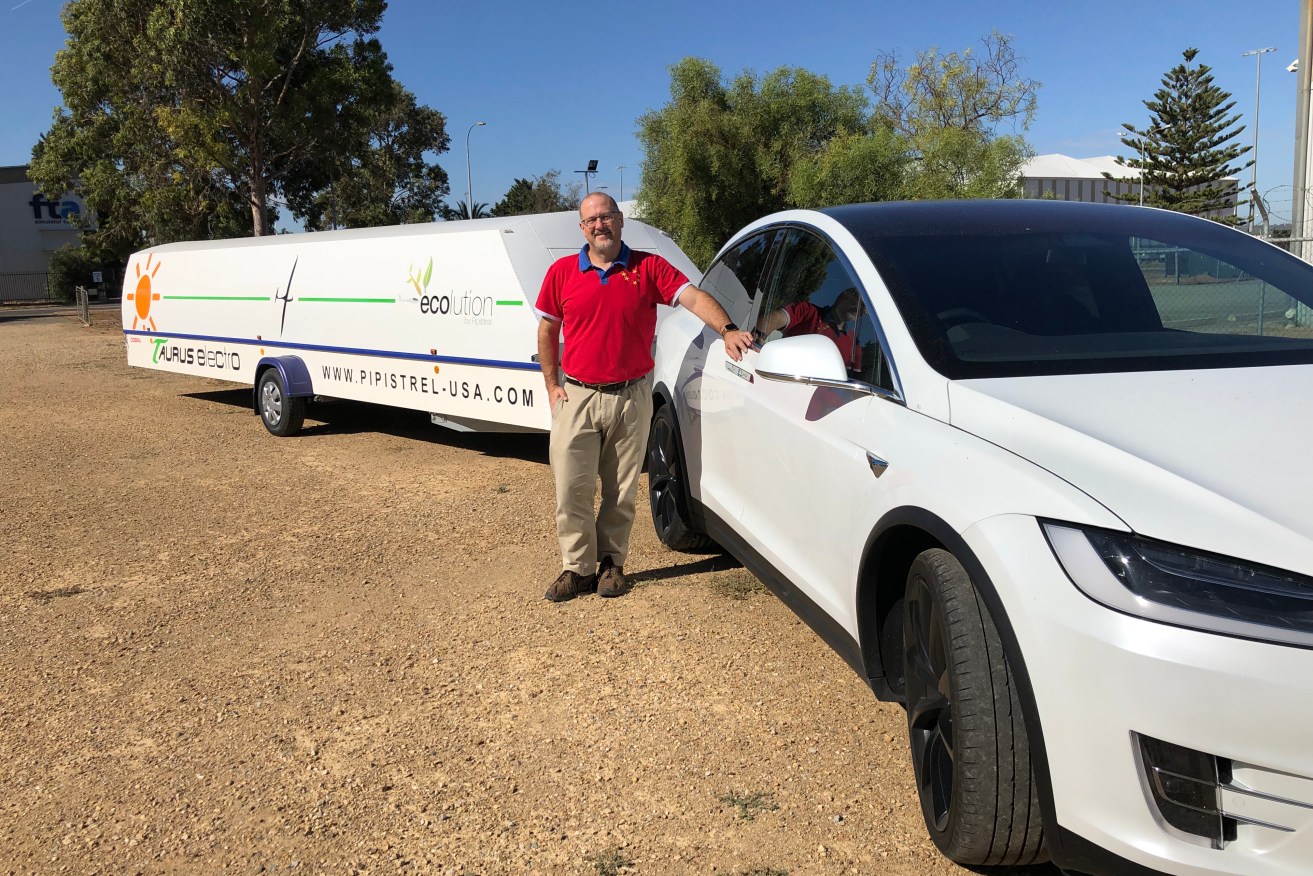Embrace the electric vehicle revolution: Hackett
With the federal election imminent, an Adelaide technology entrepreneur calls for political leadership in getting behind the wheel of a global transport revolution.


Simon Hackett with his Model X Tesla towing his electric plane. Photo: supplied
Internode founder and entrepreneur Simon Hackett says too much political infighting and not enough innovation has caused Australia to lag behind other first world nations on electric vehicle policy – and climate policy more broadly.
“Australia in general is so bereft in renewable energy policy in general… it doesn’t know if it wants to have a carbon price or not, [it] doesn’t know if that’s good or bad,” Hackett said.
“The irony is it’s good but … somehow the major parties are only interested in arguing about crazy things.
“If you can’t even decide if solar and battery incentives are good in your house, it’s hard to get your brain as far as what you might drive on the street.
“We are distinguished in Australia for being the first world economy that has the least incentives for electric cars, and so perhaps it’s not surprising that we are also the global laggard in the uptake of them… in a first world sense.”
While the United States, Europe and Asia embrace electric vehicles, at the beginning of 2018 electric vehicles made up just 0.1 per cent of Australia’s new vehicle sales.
Norway, by comparison, had more than 20 per cent of new sales coming from electric vehicles.
In a bid to increase Australia’s electric vehicle uptake, Labor’s climate policy includes a national electric vehicle target of 50 per cent of all new car sales by 2030, a government fleet target of 50 per cent by 2025 and tax deductions for businesses purchasing electric vehicles.
But Hackett, an early owner of a Tesla electric car, says the policy doesn’t go far enough.
He wants a major party to adopt the Greens transport sector policy, which includes a 100 per cent electric vehicle target by 2030 and the establishment of a $151 million fund to provide grants for the installation of public electric vehicle charging infrastructure.
“It is not greatly different to the policy structures now in place and actively being deployed in multiple comparable countries,” he said.
“It would also create the economic conditions that could drive a return to Australia vehicle manufacture of innovative cars.
“[But] I don’t see either [Labor or the Coalition] having the mental strength to adopt the Greens EV/transport sector policy, but I do very much wish that one of them would.
“As the late Steve Jobs reminded us: Good artists copy, great artists steal. I wish one of the majors would steal that policy and call it their own.”
However, he says Labor’s policy is a great start.
“Having a policy advancing the presence of EVs – at all – is far better than no policy at all or, worse, active anti-EV sentiment for the sake of attempting to create a contrived policy differential,” says Hackett.
“The fact that Labor have a policy is interesting because it’s sent the Coalition into a tight spiral. Ironically both major parties support the idea of EVs, it’s just for the purpose of this election campaign the Coalition are saying they don’t just to create an artificial policy difference.”
In 2018 Treasurer Josh Frydenberg penned a story for Fairfax media, spruiking electric vehicles and forecasting one million of them on Australian roads by 2030.
“A global revolution in electric vehicles is under way”, wrote Frydenberg. “And with the right preparation, planning and policies, Australian consumers are set to be the big beneficiaries.”
Despite that past enthusiasm for electric vehicles, Energy Minister Angus Taylor told the ABC earlier this month a returned Coalition Government would not follow the lead of other countries.
Despite this, he said the Coalition was not against electric cars, and was working on an electric vehicle strategy.
Hackett said Australian electric vehicle critics only need to look overseas to see the benefits.
“[Politicians] saying things that are directly false in order to try and create an artificial policy difference is just ludicrous, and you see these statements that are just complete rubbish,” says Hackett.
On claims that electric vehicles don’t have the power to tow, Hackett laughs: “Bloody hell, of course they can,” he said..
“Look on YouTube, you can find a variety of people using their Tesla Xs, the one we have, to tow trailers which in turn have sports cars in them… these things are incredibly powerful for towing, of course they can tow things.
“There’s this whole conversation that they won’t be practical, that they take too long to charge. That’s just silly. The answer for ‘how long it takes to charge?’ for most people is the same answer for ‘how long does it take to charge your smart phone?’ The answer is, I don’t know. I’m asleep at the time.
“It’s a habit thing. It takes 10 seconds to charge an EV. You plug it into your garage, and you walk away and in the morning it’s full. Everything else is noise.”
Want to comment?
Send us an email, making it clear which story you’re commenting on and including your full name (required for publication) and phone number (only for verification purposes). Please put “Reader views” in the subject.
We’ll publish the best comments in a regular “Reader Views” post. Your comments can be brief, or we can accept up to 350 words, or thereabouts.
InDaily has changed the way we receive comments. Go here for an explanation.




